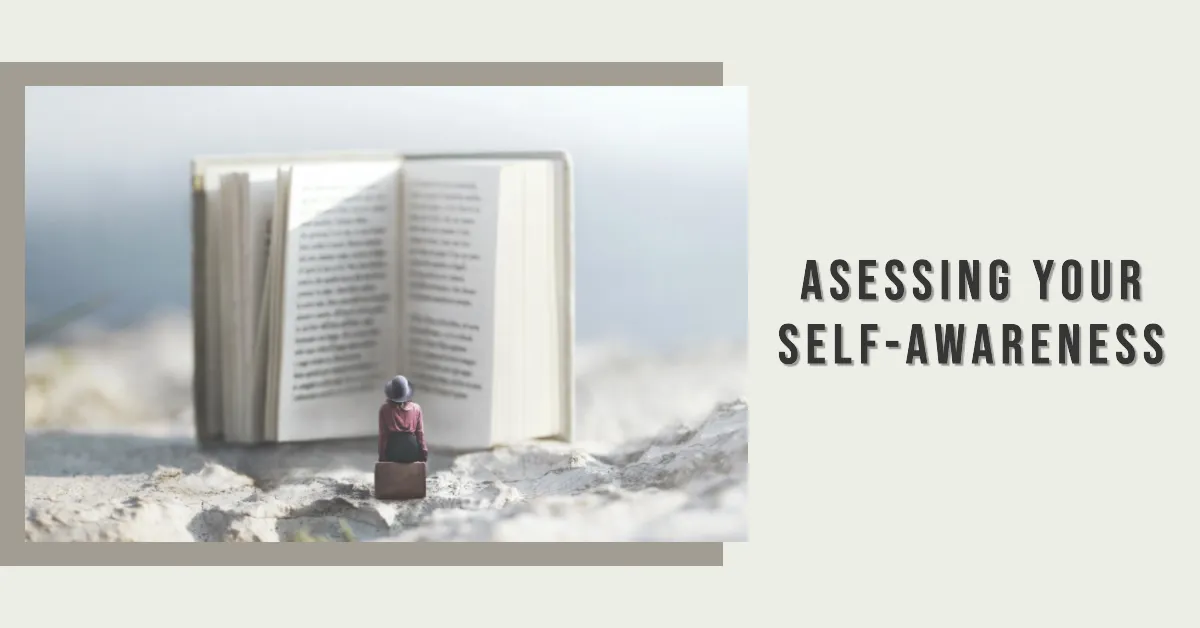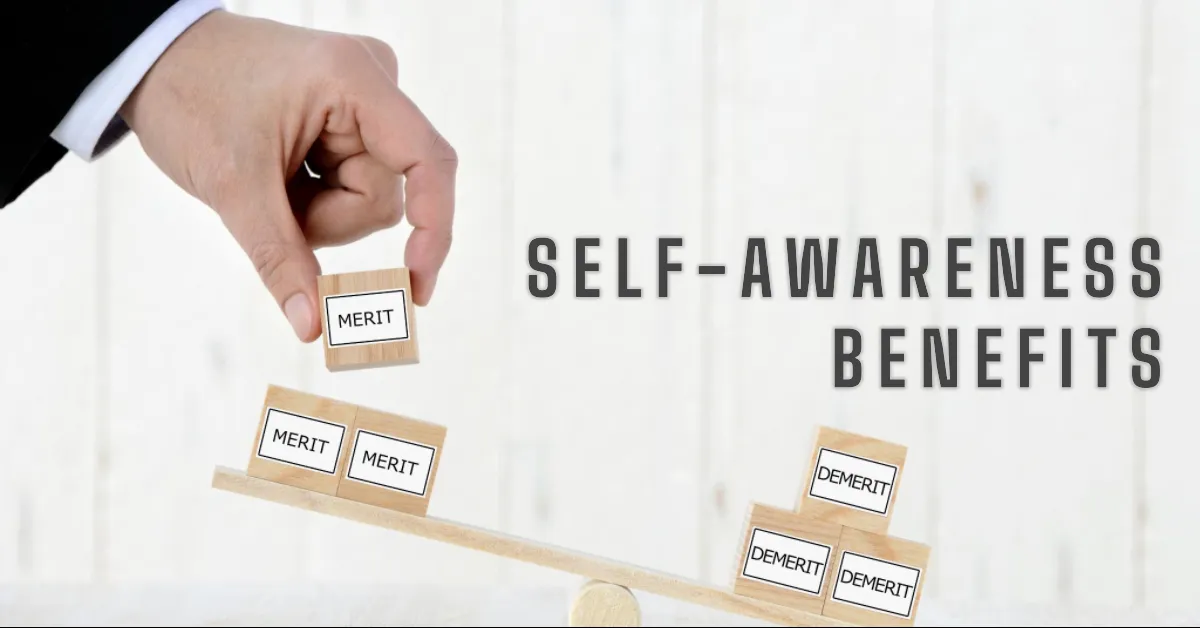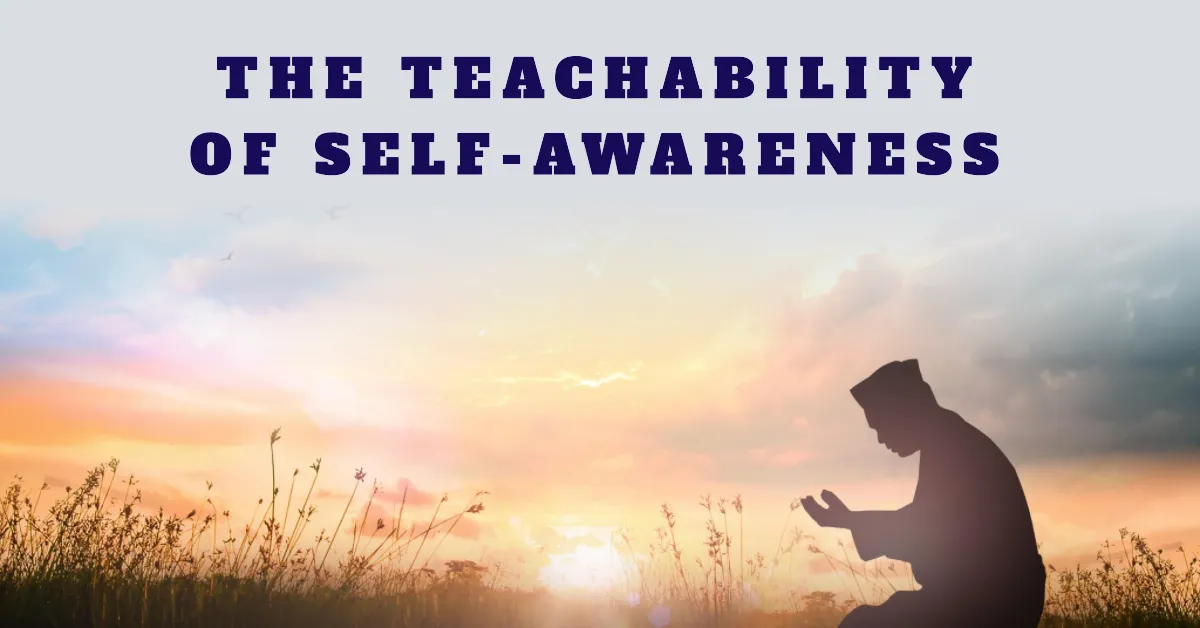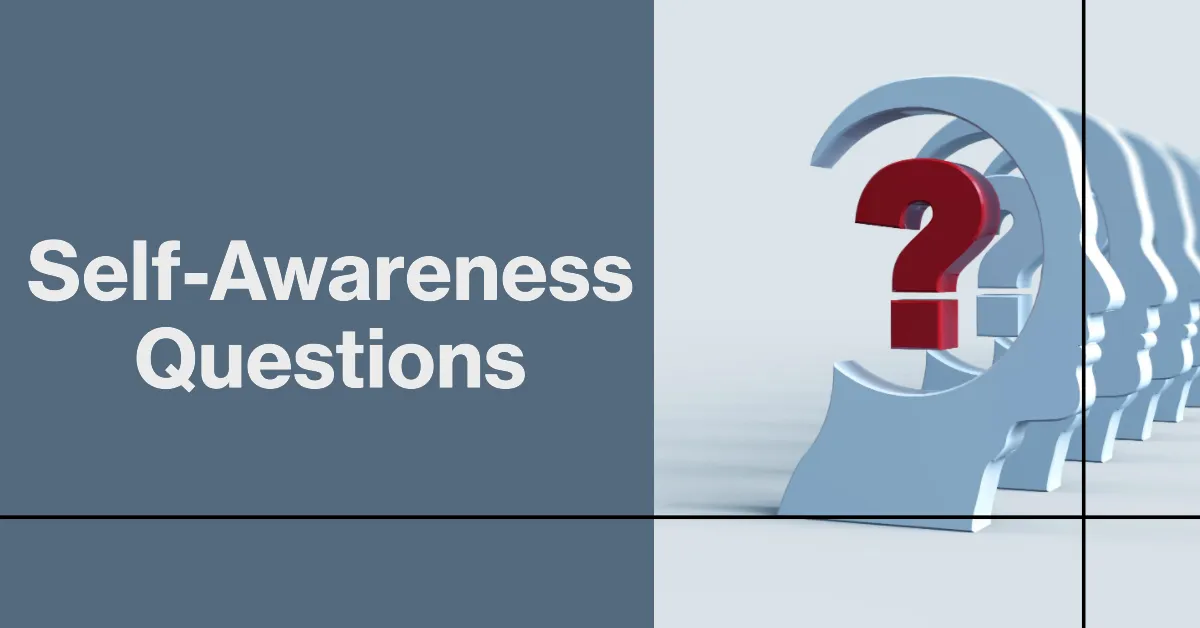Self-awareness, a significant facet of human cognition, facilitates personal growth by fostering introspective abilities. This article dives into the dynamics of self-awareness, exploring its meaning and processes for assessment. Strategies for development are discussed, followed by an examination of benefits derived from improved self-awareness. The potential to enhance this crucial cognitive capacity is also investigated, providing readers with comprehensive insights into the journey toward becoming self-aware.
Table of Contents
Key Takeaways
- Self-awareness is the understanding and knowledge of one’s own personality, feelings, and motives;
- It is distinct from consciousness, which is being aware of one’s environment and body;
- Self-awareness is crucial for personal growth and development and plays a role in introspection and understanding one’s own thoughts and behaviors;
- The development of self-awareness in humans is a progressive process, starting from recognition of proprioceptive and visual information in infants to reflective self-awareness and objective self-awareness in children;
What Does It Mean to Be Self-Aware?

In the exploration of human consciousness, self-awareness emerges as a critical concept that entails the recognition and understanding of one’s individual character, motivations, and desires. This discussion delves into the essence of self-awareness, distinguishing between its two primary forms: external (awareness of how one is perceived by others) and internal (introspective awareness of personal feelings and thoughts). Furthermore, this conversation underscores the importance of self-awareness in personal development, offers an overview of self-awareness theory, and examines the significant role played by self-consciousness in fostering a heightened sense of self-understanding and improving one’s performance in various areas of life.
The Definition of Self-Awareness
Self-awareness, as a significant aspect of personal growth and development, involves comprehending one’s character, feelings, motives, and desires distinct from consciousness which is awareness of one’s environment, body, and lifestyle. By definition of self-awareness, it encompasses the ability to recognize oneself as an individual separate from the environment and other individuals. This theory of self-awareness suggests that it helps in identifying personal strengths and weaknesses. It allows for critical reflection on actions and behaviors which ultimately leads to improvement. A strong sense of self-awareness aids in understanding others’ perception about oneself thereby facilitating better interpersonal relationships. Emphasizing its importance becomes vital in creating a healthier mental space for personal growth and fostering positive social interactions.
Types of Self-Awareness: External and Internal
External and internal are the two main types of self-awareness, each playing a distinct role in how individuals perceive their character, feelings, motives, and desires. External self-awareness manifests when one sees oneself from the perspective of others. It encourages understanding and empathy toward societal expectations and norms. On the other hand, internal self-awareness relates to personal reflection on emotions, ambitions, and values, all leading to an authentic sense of self. Aligning these two types of self-awareness can result in a harmonious balance between individuality and social adaptation. Developing both external and internal self-awareness is instrumental for personal growth and effective interpersonal relationships. It fosters emotional intelligence that aids in navigating life’s challenges with resilience and confidence.
Why Is Self-Awareness Important?
Understanding one’s own personality, emotions, and desires holds significant importance as it contributes to personal growth, development, and the ability to foster effective interpersonal relationships. This understanding is known as self-awareness. The benefits of self-awareness are manifold: it aids in decision-making processes, improves communication skills, fosters empathy toward others, and enhances leadership capabilities. Furthermore, the development of self-awareness promotes emotional intelligence by enabling an individual to comprehend how their thoughts and emotions influence behaviors. Therefore, why is self-awareness important? It offers a deeper understanding of oneself that leads to better management of personal and professional relationships while promoting overall wellbeing. In essence, self-awareness serves as a fundamental stepping stone toward achieving success in various life aspects.
Self-Awareness Theory: An Overview
In the realm of psychology, self-awareness theory postulates that individuals evaluate their own behavior against internal standards and values when they focus on themselves. This major theory of self-awareness underscores the importance of introspective processes in shaping actions and decisions. Understanding the aspects of self-awareness can be instrumental in achieving personal growth and fostering healthier interpersonal relationships. It encourages individuals to reflect upon themselves objectively, thereby promoting personal development and facilitating behavioral adjustments. The tenets of self-awareness theory advocate for a more thoughtful approach to individual behavior, stimulating a deeper comprehension of one’s motivations, preferences, strengths, and weaknesses. In essence, this psychological perspective offers an instructive framework for cultivating enhanced self-understanding and emotional intelligence.
The Role of Self-Consciousness in Self-Awareness
The concept of self-consciousness, a heightened sense of self-awareness characterized by apprehension about one’s own appearance, actions, or general presence in the social environment, holds significant relevance in psychological discussions related to self-awareness. The role of self-consciousness in self-awareness is profound as it encourages introspection and reflection. It acts as an illuminating mirror that helps individuals become more self-aware by recognizing their strengths and weaknesses. This understanding fosters personal growth and motivates change. However, an excessive focus on oneself can lead to anxiety or negative emotional states. Hence, a delicate balance between awareness and acceptance is crucial for optimal levels of self-consciousness that contribute beneficially to overall psychological wellbeing.
How Can You Assess Your Level of Self-Awareness?

Comprehending one’s level of self-awareness forms the crux of personal development and fosters a deep-seated understanding of oneself. Central to this process are self-reflection and introspection, powerful tools that aid in nurturing this awareness, with practices such as journaling and the development of mental resilience offering valuable insights into our thought patterns. Furthermore, it is through self-awareness that individuals can gain a profound comprehension of others, further enhancing social interactions and relationships.
Understanding Your Level of Self-Awareness
Understanding one’s level of self-awareness necessitates a thorough examination of personal motives, desires, and behaviors. This understanding is the cornerstone of emotional intelligence and fundamental to fostering self-improvement. The process involves delving into intrinsic factors that define individuality and carrying out objective self-assessment. Through this approach, it becomes possible to identify strengths, weaknesses, values, passions, and biases – all integral aspects in achieving comprehensive self-understanding.
The five levels of self-awareness play an instrumental role in this pursuit; they range from recognizing oneself as distinct from the environment to distinguishing personal thoughts as unique. Essential in identifying these levels is a commitment to continual learning about oneself. As such, cultivating an understanding of your level of self-awareness is crucial for driving personal growth and accomplishments.
Self-Reflection and Introspection: Tools for Developing Self-Awareness
Moving from a basic understanding of one’s own level of self-awareness, the focus now shifts to the utilization of self-reflection and introspection as tools for developing self-awareness. Emphasis is placed on these methods due to their proven efficacy in enhancing an individual’s understanding of personal thoughts, emotions, and behavior patterns. Through regular practice of self-reflection and introspection, individuals can gain valuable insights into their unique emotional responses and behavioral tendencies. This process supports continuous learning about oneself, thereby fostering greater self-awareness. It becomes evident that practicing self-awareness through these techniques is a reliable way to develop a more profound sense of identity and purpose, ultimately leading to improved decision-making skills and overall wellbeing.
The Power of Journaling for Self-Awareness
Journaling as a tool for introspection significantly contributes to enhancing one’s consciousness of personal tendencies, emotions, and reactions. This method is instrumental in building self-awareness, with the power of journaling for self-awareness being increasingly recognized. It provides an accessible means to document experiences, feelings, and thoughts which can be revisited and analyzed at leisure. This reflective activity allows individuals to discern patterns in their behavior and emotional responses over time. Apart from that, it encourages candid expression without fear of judgment or criticism. As a practical tip for improving self-awareness through journaling, consistency is key. Regular entries encourage continuous reflection on personal growth and change, fostering higher degrees of self-understanding and consequently promoting healthy psychological development.
How Self-Awareness Allows You to Understand Others?
Having explored the practice of journaling as a tool to enhance self-awareness, the focus now shifts to an equally important aspect: understanding how self-awareness allows one to understand others. In essence, self-awareness equips individuals with the ability to perceive their own emotions and behaviors, which in turn aids in interpreting those of others. This heightened level of comprehension fosters empathy and facilitates effective communication. A more profound understanding of oneself bestows clarity about personal values and beliefs. Concurrently, it enables a broader perspective on how these aspects may differ for others. Therefore, developing self-awareness not only contributes to personal growth but also enhances interpersonal relationships by offering insights into the motivations and actions of others.
How to Develop Self-Awareness?

The journey to self-awareness is a transformative process that begins with recognizing personal strengths and weaknesses. Through the practice of mindfulness, it becomes possible to cultivate deeper levels of self-knowledge, forging a path toward objective self-awareness. This discussion will explore practical exercises for enhancing self-understanding, as well as actionable steps for improving overall awareness, providing guidance on this essential path to personal growth and empowerment.
Understanding Your Strengths and Weaknesses
Understanding one’s strengths and weaknesses is an integral part of developing self-awareness, as it allows for critical introspection into personal abilities and areas in need of improvement. This process encourages the development of self-awareness skills, thus facilitating a comprehensive understanding of oneself. Recognizing their own reflection is a vital step toward awareness; not only does it represent physical appearance but also embodies the internal attributes that define individuality. Acknowledging strengths provides motivation and confidence while identifying weaknesses offers opportunities for growth and learning. Therefore, understanding your strengths and weaknesses is not about highlighting discrepancies but rather about empowering individuals to utilize their potential optimally. Through continuous effort, progress can be made in building stronger self-awareness skills leading to improved personal and professional life outcomes.
Practicing Mindfulness to Build Self-Awareness
Practicing mindfulness initiates the process of building self-awareness by focusing attention on present experiences and emotions. This practice allows one to improve self-awareness as it encourages understanding of personal thoughts, feelings, and reactions in real time. Time alone can be an effective tool for this process since it helps in eliminating distractions and enhancing concentration. Regularly engaging in mindfulness exercises, such as meditation or deep-breathing techniques, contributes significantly toward developing a heightened sense of self-awareness. Utilizing these strategies can foster a better understanding of personal strengths, weaknesses, beliefs, motivations, and emotional responses. Thus, practicing mindfulness to build self-awareness is a practical approach that offers valuable insights into one’s own identity and fosters growth through introspection.
Objective Self-Awareness: How to Achieve It
Objective self-awareness, a psychological state in which individuals see themselves through the eyes of others, can be achieved by consistently reflecting on personal actions and their impacts. Objective self-awareness theory posits this as a crucial step toward developing empathy and understanding social dynamics. Self-awareness requires regular introspection, critical analysis of one’s behavior, and acceptance of feedback from others. Through this process, it becomes possible to modify behaviors that may negatively impact relationships or hinder personal growth. Ultimately, self-awareness is the recognition of one’s strengths and weaknesses, fostering resilience and adaptability in the face of challenges. It provides an opportunity for learning, growth, and progress – all instrumental in achieving success across various life spheres.
Exercises for Developing Greater Self-Awareness
Engaging in specific exercises can significantly contribute to enhancing one’s perception of personal characteristics, feelings, motives, and desires. Exercises for developing greater self-awareness include daily mindfulness practices such as meditation or journaling (as mentioned before); these allow for introspection and the identification of emotional triggers. Seeking feedback from trusted individuals can also provide valuable insight into personal behaviors and interactions. Furthermore, becoming self-aware involves ongoing learning and development; therefore, an open mindset toward growth is essential. Consistent application of these strategies will lead to increased self-knowledge and understanding. Therefore, this journey toward becoming more self-aware requires commitment but offers invaluable benefits in terms of personal growth and improved interpersonal relationships. Ultimately, how to develop self-awareness depends on individual willingness to engage in consistent reflective practices.
Steps to Improve Your Self-Awareness: Practical Tips to Becoming More Aware
Strategies for heightening the understanding of one’s own emotions, motivations, and behaviors include regular introspection, soliciting external feedback, and mindful practices. These are crucial steps to improve your self-awareness. A commitment to ongoing learning about oneself is essential in becoming self-aware: how to develop self-awareness becomes a journey rather than a destination. Engaging in mindful practices can enhance focus and clarity, illuminating patterns of thoughts and reactions that may have previously gone unnoticed. Regularly seeking external feedback provides an outside perspective on personal actions and interactions. Combining these practical tips with introspective activities such as journaling or meditation can significantly contribute to becoming more aware. Such dedication toward enhancing self-understanding promotes personal growth and more effective interpersonal relationships.
What Are the Benefits of Improving Self-Awareness?

Understanding the pivotal role self-awareness plays in personal development is instrumental, as it innately fosters growth and facilitates the achievement of individual goals. Recognizing the benefits of self-awareness in enhancing emotional intelligence not only enriches interpersonal relationships but also significantly contributes to career progression by improving decision-making skills and leadership qualities. Furthermore, exploring the profound connection between self-awareness and mental health can provide valuable insights into managing stress, boosting resilience, and promoting overall wellbeing.
How Self-Awareness Can Help in Personal Development?
In the realm of personal development, self-awareness contributes significantly by fostering an understanding of one’s character, feelings, motives, and desires. It is a cornerstone for becoming self-aware and plays a pivotal role in personal growth. The process of introspection allows for the recognition of strengths and weaknesses, thus facilitating improvement. Developing self-awareness requires time and mindful practice; however, this investment yields significant benefits in personal development. By acknowledging internal states, individuals can make informed decisions aligning with their values. This alignment often results in improved satisfaction across various life domains. Indeed, the need for self-awareness is critical: it serves as a catalyst for change and progress toward achieving personal goals.
Benefits of Self-Awareness in Emotional Intelligence
Having explored the role of self-awareness in personal development, attention now turns to its benefits in emotional intelligence. Enhanced emotional intelligence is one compelling advantage of heightened self-awareness. This cognitive ability allows humans to manage their emotions effectively, leading to improved interpersonal relationships and communication skills. The merits of self-awareness extend beyond individual growth; they permeate into the social fabric by fostering empathy and understanding – key components of emotional intelligence. It facilitates recognition not only of personal emotions but also those of others, thereby nurturing compassion and tolerance. Thus, cultivating self-awareness may serve as a springboard for boosting emotional intelligence, and enhancing human interaction’s overall quality. Therefore, it becomes imperative to understand these dynamics better and leverage them for comprehensive growth.
Self-Awareness for Better Interpersonal Relationships
Enhanced emotional intelligence, a notable product of self-awareness, significantly contributes to building successful interpersonal relationships. It can be deduced that the progression toward improved relationships starts with self-awareness. The ability to perceive one’s feelings and thoughts allows for the evaluation of personal behavior and reactions in various situations. By doing so, this paves the way for an empathetic understanding of others’ perspectives, thus nurturing stronger bonds. Feedback from people around is instrumental in this process as it offers alternative viewpoints and helps see how self-awareness impacts interactions. Through consistent practice and openness to feedback, individuals can effectively utilize self-awareness for better interpersonal relationships, thereby manifesting increased effectiveness in both personal and professional spheres.
Impact of Self-Awareness on Career Progression
Career progression is significantly influenced by the degree of one’s self-awareness, as it aids in identifying strengths, weaknesses, and areas for improvement. An executive coach often utilizes research on self-awareness to facilitate this process. By fostering a climate of introspection and discovery, these professionals guide individuals toward recognizing their potential and outlining strategies for advancement. The impact of self-awareness on career progression cannot be overstated; it enables individuals to align personal goals with professional aspirations effectively. Consequently, they can navigate challenges confidently while capitalizing on opportunities that support growth and development. In essence, the cultivation of self-awareness serves as an invaluable tool in shaping one’s career trajectory toward success.
Self-Awareness and Mental Health: The Connection
The correlation between mental health and the capacity to perceive one’s own emotions, thoughts, and behaviors accurately is a significant area of research in psychology. The connection between self-awareness and mental health highlights the importance of individuals becoming aware of their internal states for optimal psychological wellbeing. Developing self-awareness can be transformative as it helps individuals recognize destructive patterns, leading to healthier coping strategies. Furthermore, different degrees of self-awareness might influence distinct facets of mental health. For instance, high emotional awareness may contribute to better management of stress while cognitive awareness could enhance problem-solving abilities. Therefore, fostering a deep understanding and practice of self-awareness seems fundamental not only for personal growth but also for maintaining robust mental health.
Can Self-Awareness Be Taught and Improved?

Exploring the capacity for self-awareness to be honed and improved, this discussion will delve into the concept that self-awareness is not a fixed trait but rather a trainable ability. This discourse will tackle questions surrounding the feasibility of teaching self-awareness skills, what such training might entail, and various methods of cultivating a more profound understanding of oneself. Additionally, it will examine theories offering insight into factors that may either facilitate or obstruct the development of self-awareness, providing a comprehensive analysis of this pivotal aspect of personal growth.
Self-Awareness Is a Trainable Ability
Developing self-awareness is a trainable ability that involves understanding one’s character, feelings, motives, and desires. The process of becoming self-aware can be enhanced through diligent practice and conscious effort. This development provides insight into personal tendencies, allowing for improved decision-making and increased emotional intelligence. Techniques such as mindfulness meditation and journaling may aid in fostering self-awareness. As self-awareness develops over time, it contributes significantly to personal growth by promoting healthier relationships, enhancing career success, and boosting overall happiness. Self-reflection strategies are essential tools for cultivating this skill set. Therefore, the journey toward becoming more self-aware should be approached with patience and persistence; it is a rewarding endeavor that yields profound benefits in various aspects of life.
Teaching Self-Awareness Skills: Is It Possible?
Imparting skills related to introspective understanding is indeed feasible, as evidenced by various pedagogical strategies and techniques. The process of teaching self-awareness skills: is it possible? Yes, it certainly is. Educators can employ reflective exercises that encourage learners to examine their thoughts, feelings, and actions critically. In becoming self-aware: how to develop self-awareness? One must cultivate mindfulness through regular practice, enhancing both emotional intelligence and empathy. Furthermore, constructive feedback from peers or mentors aids in this endeavor by providing an external perspective on one’s behavior. Self-awareness can lead to profound personal growth – fostering resilience, promoting better decision-making, and improving interpersonal relationships. Through consistent efforts toward developing such awareness, one can truly harness the benefits of a more enlightened existence.
Self-Awareness Training: What Does It Involve?
Having explored the feasibility of teaching self-awareness, attention now shifts to understanding self-awareness training. This process is instrumental in becoming self-aware and provides individuals with tools to develop self-awareness effectively. Self-awareness training entails various methods designed to enhance personal insight and recognize emotions, behaviors, and perceptions. The foundation lies in introspection and observation, coupled with feedback from others. Techniques like deep insight meditation, automatic writing, or engaging in hypnotherapy can be valuable resources on this journey toward greater awareness. It should be remembered that developing self-awareness is a continuous process rather than an end goal; it requires consistent effort and willingness for exploration. Thus, the path toward becoming more self-aware through targeted training can indeed form a transformative journey worthy of pursuit.
Ways to Develop a Deeper Sense of Self-Awareness?
Exploration of diverse strategies to cultivate a profound comprehension of one’s individuality forms the focus of this discussion. A key aspect is fostering deeper self-awareness, an endeavor that demands concentrated effort and conscious application. Notably, journal writing can serve as a powerful tool in this pursuit, providing valuable insights into one’s thoughts, feelings, and reactions. Similarly, mindfulness practices such as meditation encourage focus on the present moment and enhance awareness of internal states. Regular introspection is another way to develop greater self-understanding. Engaging in constructive dialogue aids in becoming self-aware by offering different perspectives on personal behavior and beliefs. Ultimately, these methods collectively contribute to building a more substantial sense of self-awareness.
Theories About What Promotes or Hinders Self-Awareness Development
Various theories propose factors that promote or hinder the evolution of individual consciousness and introspective abilities. Exploring these theories aids in understanding self-awareness development. One influential theory suggests mindfulness is a key facilitator of heightened introspection. Mindfulness, characterized by present-moment awareness, allows for a detailed examination of personal thoughts and feelings, fostering greater self-understanding. Conversely, chronic distraction is seen as an impediment to developing self-awareness due to its tendency to detach individuals from their inner experiences. Environmental influences also play a significant role in shaping one’s self-awareness. Supportive environments can foster open exploration of the self while restrictive ones may hinder it. Therefore, understanding these theories about what promotes or hinders self-awareness development provides valuable insights into enhancing personal growth and wellbeing.
Self-Awareness: Questions and Answers

What are the types of self-awareness?
There are mainly two types of self-awareness – internal and external. Internal self-awareness is the ability to recognize one’s emotions, beliefs, and values, while external self-awareness refers to a person’s understanding of how others see them.
What are the benefits of self-awareness?
Good self-awareness can lead to improved relationships, greater emotional intelligence, higher self-confidence, and better decision-making skills. Such high self-awareness outcomes were validated in a questionnaire by Daniel Goleman, who linked them to successful leadership. Plus, it’s a foundation for personal growth, and self-acceptance, and leads to an improved self-concept.
What leads to a state of greater self-awareness?
Greater self-awareness occurs through a continual process of self-discovery and introspection. Recognizing your thoughts, feelings, and the ability to monitor your reactions, asking for feedback, practicing reflection in a mirror, mindfulness, understanding your strengths and weaknesses, and knowing how others see you can lead to an improved state of self-awareness. It requires time, patience, and authenticity.
How does one build self-awareness skills from scratch?
To build self-awareness skills, you must first understand that self-awareness is the ability to recognize and understand personal moods, emotions, and drives. Spend regular time in introspection, say “yes” to time for mindfulness practice, ask for feedback from trusted ones, and learn to identify and control negative thoughts. Moreover, aim for understanding others’ perspectives to build your external self-awareness.
What are the ways to improve your self-awareness?
Improve your self-awareness through practices such as introspection, mindfulness, and asking for feedback. Remember that self-awareness isn’t simply about having an introspective tendency – it’s about self-exploration and also understanding how others see you. Make time to think and journal, and don’t shy away from reflection in the mirror, both literally and figuratively.
How does emotional intelligence relate to self-awareness?
Emotional Intelligence is all about being aware and managing your own emotions along with those of others. This begins with self-awareness – the ability to monitor personal feelings and reactions. High self-awareness, as Daniel Goleman suggests, is a cornerstone of high emotional intelligence.
What does self-consciousness have to do with self-awareness?
Self-consciousness is often referred to as an acute state of self-awareness. According to Shelley Duval’s self-awareness theory, self-consciousness involves self-focused attention which leads us to compare our current behavior to our internal standards and values. This, in turn, tends to amplify self-awareness.
How does introspection contribute to becoming more self-aware?
Introspection, or examining one’s inner self and feelings, is a chief way to become more self-aware. When you introspect, you reflect upon your experiences, actions, emotional reactions, and attitudes. This helps to recognize patterns or changes in behavior and paves the way for greater self-awareness through a more nuanced understanding of oneself.
Can you explain the self-awareness theory?
Self-awareness theory, put forward by psychologists Shelley Duval and Robert Wicklund, suggests that self-awareness is a result of self-focused attention. In their view, when we become the center of our own observation, we tend to think, evaluate, and compare our current behavior to our inherent values or standards. This allows for the incremental development of self-awareness.
Can you share some tips for improving self-awareness?
Some tips for improving self-awareness include practicing mindfulness, journaling, seeking feedback, practicing introspection, undertaking personality and psychometric tests, engaging in strength and weakness analysis, and investing time in self-discovery. It’s also beneficial to understand the difference between what you think others think of you compared to what they actually do – this helps bridge any perception gaps.




